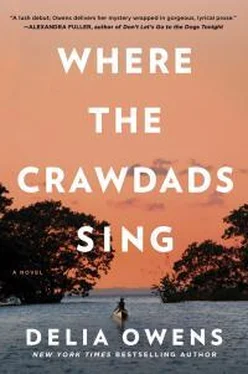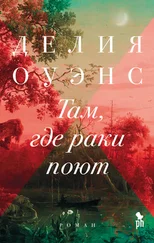At the bottom of the carton was a note. She unfolded it and looked at the words, written carefully in simple script that a child could read. Kya knew the time of the tides in her heart, could find her way home by the stars, knew every feather of an eagle, but even at fourteen, couldn’t read these words.
She had forgotten to bring anything to leave. Her pockets yielded only ordinary feathers, shells, and seedpods, so she hurried back to the shack and stood in front of her feather-wall, window-shopping. The most graceful were the tail feathers from a tundra swan. She took one from the wall to leave at the stump next time she passed.
As evening fell, she took her blanket and slept in the marsh, close to a gully full of moon and mussels, and had two tow bags filled by dawn. Gas money. They were too heavy to tote, so she dragged the first one back toward the lagoon. Even though it wasn’t the shortest route, she went by way of the oak clearing to leave the swan feather. She walked into the trees without looking, and there, leaning against the stump, was the feather boy. She recognized him as Tate, who had shown her the way home through the marsh when she was a little girl. Tate, who, for years, she had watched from a distance without the courage to go near. Of course, he was taller and older, probably eighteen. His golden hair stuck out from his cap in all manner of curls and loose bits, and his face was tan, pleasing. He was calm, smiled wide, his whole face beaming. But it was his eyes that caught her up; they were golden brown with flecks of green, and fixed on hers the way heron eyes catch a minnow.
She halted, shaken by the sudden break in the unwritten rules. That was the fun of it, a game where they didn’t have to talk or even be seen. Heat rose in her face.
“Hey, Kya. Please . . . don’t . . . run. It’s . . . just me . . . Tate,” he said very quietly, slowly, like she was dumb or something. That was probably what the townspeople said of her, that she barely spoke human.
Tate couldn’t help staring. She must be thirteen or fourteen, he thought. But even at that age, she had the most striking face he’d ever seen. Her large eyes nearly black, her nose slender over shapely lips, painted her in an exotic light. She was tall, thin, giving her a fragile, lithesome look as though molded wild by the wind. Yet young, strapping muscles showed through with quiet power.
Her impulse, as always, was to run. But there was another sensation. A fullness she hadn’t felt for years. As if something warm had been poured inside her heart. She thought of the feathers, the spark plug, and the seeds. All of it might end if she ran. Without speaking, she lifted her hand and held the elegant swan feather toward him. Slowly, as though she might spring like a startled fawn, he walked over and studied it in her hand. She watched in silence, looking only at the feather, not his face, nowhere near his eyes.
“Tundra swan, right? Incredible, Kya. Thank you,” he said. He was much taller and bent slightly as he took it from her. Of course, this was the time for her to thank him for his gifts, but she stood silent, wishing he would go, wishing they could stick to their game.
Trying to fill the silence, he continued. “My dad’s the one who taught me birds.”
Finally she looked up at him and said, “I can’t read yo’ note.”
“Well, sure, since you don’t go to school. I forgot. All it said was, I saw you a couple of times when I was fishing, and it got me thinking that maybe you could use the seeds and the spark plug. I had extra and thought it might save you a trip to town. I figured you’d like the feathers.”
Kya hung her head and said, “Thank you for them; that was mighty fine of you.”
Tate noticed that while her face and body showed early inklings and foothills of womanhood, her mannerisms and turns of phrase were somewhat childlike, in contrast to the village girls whose mannerisms—overdoing their makeup, cussing, and smoking—outranked their foothills.
“You’re welcome. Well, I better be going, getting late. I’ll drop by now and then, if that’s okay.”
Kya didn’t say a word to that. The game must be over. As soon as he realized she wasn’t going to speak again, he nodded to her, touched his hat, and turned to go. But just as he ducked his head to step into the brambles, he looked back at her.
“You know, I could teach you to read.”
16. Reading
1960
For days, Tate didn’t return for the reading lessons. Before the feather game, loneliness had become a natural appendage to Kya, like an arm. Now it grew roots inside her and pressed against her chest.
Late one afternoon, she struck out in her boat. “I cain’t just sit ’round waitin’.”
Instead of docking at Jumpin’s, where she’d be seen, she stashed her rig in a small cove just south and, carrying a croker sack, walked down the shaded path toward Colored Town. A soft rain had fallen most of the day, and now as the sun neared the horizon, the forest formed its own fog that drifted through succulent glades. She’d never gone to Colored Town, but knew where it was and figured she could find Jumpin’ and Mabel’s place once she got there.
She wore jeans and a pink blouse from Mabel. In the croker sack were two pint jars of real runny blackberry jam she’d made herself to return Jumpin’ and Mabel’s kindness. A need to be with someone, a chance to talk with a woman friend urged her toward them. If Jumpin’ wasn’t home yet, maybe she could sit down with Mabel and visit a spell.
Then, nearing a bend in the road, Kya heard voices coming toward her. She stopped, listened carefully. Quickly she stepped off the path into the woods and hid behind a myrtle thicket. A minute later, two white boys, dressed in raggedy bib overalls, came around the bend, toting fishing tackle and a string of catfish long as her arm. She froze behind the thicket and waited.
One of the boys pointed down the lane. “Lookee up thar.”
“Ain’t we lucky. Here comes a nigger walkin’ to Nigger Town.” Kya looked down the path, and there, walking home for the evening, was Jumpin’. Quite close, he had surely heard the boys, but he simply dropped his head, stepped into the woods to give them a berth, and moved on.
What’s the matter with ’im, why don’t he do sump’m? Kya raged to herself. She knew nigger was a real bad word—she knew by the way Pa had used it like a cussword. Jumpin’ could have knocked the boys’ heads together, taught them a lesson. But he walked on fast.
“Jest an ol’ nigger walkin’ to town. Watch out, nigger-boy, don’t fall down,” they taunted Jumpin’, who kept his eyes on his toes. One of the boys reached down, picked up a stone, and slung it at Jumpin’s back. It hit just under his shoulder blade with a thud. He lurched over a bit, kept walking. The boys laughed as he disappeared around the bend, then they picked up more rocks and followed him.
Kya stalked through brush until she was ahead of them, her eyes glued on their caps bobbing above the branches. She crouched at a spot where thick bushes grew next to the lane, where in seconds they would pass within a foot of her. Jumpin’ was up ahead, out of sight. She twisted the cloth bag with the jam so that it was wrung tight and knotted against the jars. As the boys drew even with the thicket, she swung the heavy bag and whacked the closest one hard across the back of his head. He pitched forward and fell on his face. Hollering and screeching, she rushed the other boy, ready to bash his head too, but he took off. She slipped about fifty yards into the trees and watched until the first boy stood, holding his head and cussing.
Toting the bag of jam jars, she turned back toward her boat and motored home. Thought she’d probably never go viztin’ again.
Читать дальше











